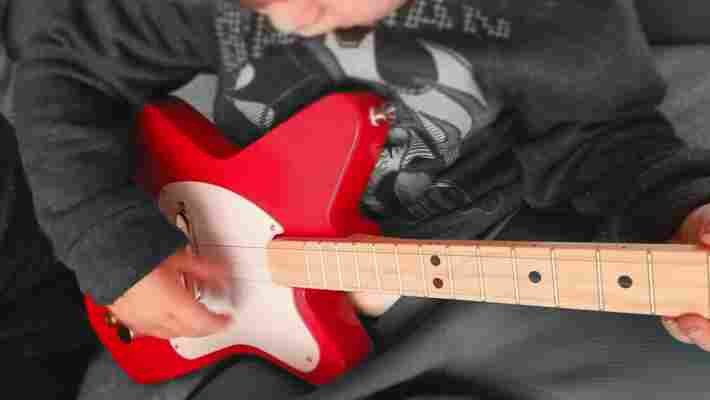
The best way to learn how to play a guitar is whichever method works for you. Anyone who tells you different is either selling something or justifying a purchase. That being said, in my experience the best guitar to teach your kids to play on – through whatever method you choose – is this Loog Pro. And that’s because the best way to get your kids interested in music is to play it with them.

There’s a never-ending torrent of kazoos, maracas, tambourines, and other instruments aimed at enabling children to explore music and rhythm, but if my toddler wants to play along with mommy and daddy while we jam on guitar he’s out of luck. At least he was until we reviewed the Loog Pro together.
His tiny hands can’t grip a real guitar and the motor and music skills he’ll learn strumming some plastic toy with fishing line for strings won’t really transfer over to his first Stratocaster. I could ditch my six-string lessons and start playing “Hot Cross Buns” on the recorder in solidarity with my kid, but that’s only going to inspire one of us to be better musicians.
What the Loog Pro provides is a fantastically crafted miniature guitar that’s small enough for a kid while still using the same tuning and fingering as a full-sized guitar. This is possible because it only uses the top three strings of a standard six-string. You play it the same way as normal, you just disregard the missing strings. It’s a genius take on the children’s instrument because it lowers the learning curve without changing the objective. Strumming, finger placement, and ‘muscle memory’ skills all transfer seamlessly to the real deal.
I should mention that Loog advertises the Loog Pro for ages eight and up — I’m not sure why, it fits perfectly in my toddler’s hands and lap. I’d certainly reccomend against alllowing a small child to play with an electric guitar unsupervised (more for fear they’d snap a string and get a finger knotted in it than anything electric ).
Here’s my just-turned-three-year-old getting acquainted with the Loog Pro:
Children his age are curious about everything, but he gets exceptionally excited about our family’s music gear. Unfortunately, part of learning an instrument is learning how to handle and take care of one. And handing your beloved Les Paul or Telecaster to a baby is like giving a demolition derby driver the keys to your Maserati. Now, whenever I pull out my guitar I can hand him this one. He can look at what I’m doing and try to imitate it.
This is the best piece of music hardware aimed at children I’ve ever seen. It’s made the exact same way a full-sized guitar is, with wooden body and neck, a metal pickup, volume knob and tuning hardware, and real guitar strings. It’s the real McCoy in every way, just shrunk down so your kid can hold it comfortably. The company makes a couple other guitars in different sizes, but this review is specific to the Loog Pro.
It’s a gorgeous Fender look-a-like made from solid components. I love the red finish, but it comes in a variety of other colors including a very cool clear lucite.
At my kid’s age (three years and one month), there’s no “Hey, lets play an ‘E’ chord and then get into some riffs” because he’s still not quite ready for organized lessons. But over the course of a few sessions he’s become familiar with holding the guitar and strumming the strings. We’ve explored pressing the frets with his little fingers, it’s all very adorable.
Here’s where I’d like to hit you with technical specifications, talk about the amp and accessories, and then urge you from the bottom of my heart to go purchase one of these for your little ones because the world needs more music makers. Unfortunately, we have to talk about the app because it’s a big part of the experience.
I’m not a very good guitar player. I’ve been using the Fender Play app and Rocksmith 2014 to get better, but I’m still rubbish. That’s fine, I love the challenge, but it also means I don’t have a lot of insight when it comes to translating what I hear Slash or Jimmi Hendrix doing to what I’m supposed to be doing with my fingers while I’m playing. I was expecting the Loog app to make up for my lack of expertise and become a tool for me to teach my kid how to play guitar.
It does that, don’t get me wrong. It has all the pieces in place for someone to teach themselves guitar – but there are far better free videos you can watch on YouTube that’ll help both you and your kid learn to play actual songs.
Let me explain. The app has cute little characters and child-friendly colors and designs. It works just fine. It has a guitar tuner that works well, a play-along-drummer that’s actually impressive, and links to a bunch of videos that’ll help you learn about the instrument and how to play all the chords. It even has a couple of cute games that, while I ultimately didn’t find educational, are at least fun to play for a few minutes at a time. The big draw for me is that the app has a dozen or so included songs you can “learn to play on day one.” Sounds great right? Not so fast.
In order to play any of the app‘s included songs you have to unlock them by nailing the chords you’ll need to perform them. I like this idea, making me earn entry to the song should ensure I’m ready to play this little three-string and jam along to a tune I know. It did not. The first song I tried, “We Are Gonna Be Friends” by The White Stripes, is one of my favorites, but the app just takes me to the official video. While it’s a really cool video, I would have much preferred to see someone playing a three-string Loog.
You get the chord you’re supposed to play on the screen – just the letter, not the fingering chart or any kind of strum pattern – and that’s it. If you can’t keep up with what Jack White is doing, oh well. I found myself able to strum the chords as they appeared, but I’m simply not good enough on guitar yet to watch White for the changes without having to check my fingering too.
Granted, with time and practice I’ll one day be good enough to jam along with the first song in the Loog guitar app, but my thought process here is that this app should be the platform that educates me and not the end goal of all my hard work. There’s better options for this portion of your guitar education, though few have a cuter interface than the Loog app.
Here’s the good news: if you’re pretty decent on guitar already, none of that applies to you. The app does everything right except bridge the gap between “here’s where you put your fingers” and “do what Jack White does.” Experienced players should have no problem helping little ones catch up to speed.
If you’re an iOS user, Loog has an AR-based app as well, but I wasn’t able to test this feature as I don’t own an iPhone or iPad.
What I did test was the excellent little three-watt amplifier that came with the guitar and it was impressive. It features a standard guitar input, volume and gain knobs, and a power switch. It’s a cute little practice amp that looks like a vintage Fender box, and it sounds great. Your kid won’t blow the doors off with it, which you may be grateful for. It also really seals the experience for the little ones because they’re jamming on a real guitar with a real amp just like you.
Another awesome edition to the Loog package is a pack of flashcards for chords. These flashcards are brilliant, easy to use, and super cute. My kid loves them and, once he’s ready to play some actual chords, these cards will almost certainly be the primary tool I use to teach him where to put his fingers.
Credit: Loog
All in all, the Loog Pro is fabulous. I came into the experience expecting a guitar-tutoring system anchored by software that featured a mediocre approximation of a guitar. I left with my jaw agape at the quality of this children’s instrument and a bit of disappointment in the app.
I recommend the Loog Pro to anyone and everyone who knows a kid that might want to jam on a guitar. Even if you’re like me, and the software experience underwhelms you, there still isn’t a better guitar for children that I’m aware of. And, as an alternative to a ukulele, this thing makes for a rocking mini strummer no matter your age.
If you’ve got the chops to shoulder the educational burden, the app and flashcards are more than enough to get your little one playing real songs. If not, you can always do a YouTube search or use something like Fender Play to find the method that works best for you.
This post includes affiliate links to products that you can buy online. If you purchase them through our links, TNW gets a small cut of the revenue at no extra cost to you